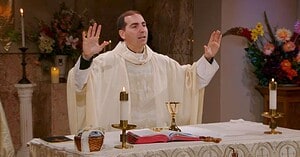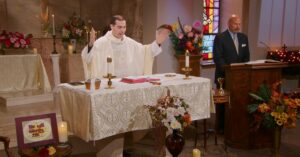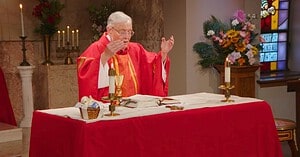Fourth Sunday of Advent
Homily Video
Fourth Sunday of Advent Homily Transcript
There’s never a bad day to talk about Mary, our Blessed Mother. If there’s one thing we can follow Joseph in, it’s that last line of the Gospel. He took his wife into his home. He took Mary into his home. Let us all friends, if there’s one thing we take away this Sunday, this fourth Sunday of Advent, let us take Mary into our home. Into our literal home, but also the home of our heart. We all desire God. We all desire fulfillment. Sometimes though, God can be abstract to us, sometimes it can be difficult, sometimes we don’t know how to turn to him, and that’s one of the ways Mary comes in and helps our faith. We can relate to Mary. She can make God, in a way, more accessible. Make her son more compassionate, more loving for us, so that we can pray to Jesus, we can pray to God the Father without any fear, without any hesitation. Mary in a way can make God more relatable for us, that’s one thing she can do. Now, if she can be relevant for this fella named Ahaz in the first reading, she can be relevant for us. So, Isaiah comes along to this ruler who is pretty far from God, he’s living in a fairly secular way and he doesn’t even wanna ask God for a sign. And Isaiah finally insists, and the sign that Isaiah says he should look for is a virgin, okay, a virgin will behold, behold the virgin will bare a child and you shall call him Immanuel, okay. So, Ahaz is already giving this sense of a woman, the Blessed Mother. And one kind of interesting spiritual or scriptural exercise we can do is study all the women for that matter in the Old Testament. Okay. All the women in the Old Testament in a way are foreshadowings of the Blessed Mother. Starting with Eve, going through the great women like Ruth and Judith and Esther and Abigail and Hannah, there’s so many women in the Old Testament. They’re beautiful figures. They each have virtues, but together, they all contribute to the Blessed Mother, who has all the virtues of all those figures in the Old Testament combined. She is the woman par excellence and she ultimately leads us to her son Jesus Christ. Now, Mary was also close with Paul, the Apostle. So, if you read our second reading today, all those great lines that St. Paul says, he calls himself a slave of Christ Jesus and he’s striving for holiness, all those things I can guarantee you he didn’t get from himself, but he was taught that by Mary. Mary herself who called her a handmaid of the Lord, right? Paul took that line from Mary. He stole it from her. But, that was a good steal. Good thievery. Striving for holiness, too. Mary is just the pure receptacle for God. She is pure holiness. She is the immaculate conception, and so she inspired Paul to that level of holiness. And then of course her husband Joseph, too. Now back to the Gospel. So friends, if there’s one thing we can focus on maybe this fourth week of Advent, it’s a short week, but a relationship with Jesus Christ and a relationship with his Mother. You know, the opening prayer we said is the end of the Angelus, so maybe we can try saying that prayer everyday of this week, up until Christmas. The Angelus. Behold, I’m the handmaid of the Lord and so on and so forth, with the Hail Mary’s in between. Foster your relationship to the Blessed Mother. You won’t regret it. You will become a saint and ultimately you’ll be with her one day in Heaven. Amen.
Readings
First Reading:
Isaiah 7:10-14
Second Reading:
Romans 1:1-7
Gospel:
Matthew 1:18-24
Featured Text
A special thank you to our friends The Perales Family.
Discover More
The Most Holy Body and Blood of Christ
June 22, 2025
The Most Holy Trinity
June 15, 2025
Pentecost Sunday
June 8, 2025
Request Sunday Mass Guide
The Sunday Mass Guide sent to your home address
Spiritual nourishment and updates from the Sunday Mass community
Monthly reflections from Fr. Scott Donahue, our Principal Celebrant


